South Dakota ethanol lobbying entered a ‘borderline,’ ‘gray’ area, critics say
- Oops!Something went wrong.Please try again later.
Emails, petitions, phone calls, one-on-one conversations, rallies: These are all traditional ways South Dakotans engage lawmakers about hot-button issues affecting them. They often do it on their own time, on their own dime and in their personal capacity.
So, when a comprehensive bill that would open the door to Summit Carbon Solutions’ multi-billion-dollar carbon dioxide pipeline was about to head to the South Dakota House for its second of four floor debates before it was signed into law, the state’s major ethanol companies came out in force to support the bill.
During the month of February, busloads of people with ties to ethanol companies, well-organized and decked out in company swag, showed up at the Capitol’s doorstep with the primary purpose of earning “yeas” from lawmakers for Senate Bill 201, currently one of the most heated topics in the state.
An Argus Leader investigation has found these companies reimbursed — and, in one case, paid — employees and board members to lobby legislators in the days leading up to the vote on SB 201. The bill itself was an affair that saw a divided House grapple with the question of whether limiting a county’s ability to regulate carbon pipelines would be worth potential economic gain from Summit Carbon’s proposed pipeline.
The state’s broadly written lobbyist laws lack clarity about compensating lobbyists. Some ethanol employees received things like bus rides, lunches and free shirts, while others were compensated to go down to Pierre by working on the clock during their business hours to lobby for the company without having to register as a lobbyist.
Ethanol companies contend they were well within their rights for their lobbying efforts and their employees’ actions. But critics of SB 201 believe the lobbyist statutes, which lack clear definitions for “lobbyist” and other terms, allowed the ethanol companies’ employees undue access to lobby lawmakers in the final days leading up to the vote on the bill.
Legislators have also questioned the ethical implications of the companies’ lobbying efforts. Their concern coincides with the revelation a CEO of one of those ethanol businesses sent a letter to a lawmaker, indicating their intent to “monitor” the lawmaker’s vote on pro- and anti-pipeline legislation and threatening to “become involved” in their upcoming campaign if they voted against their interests.
“It should scare the daylights out of any South Dakotan who’s been watching the developments … that sort of one of the linchpins of our economy, the ethanol industry, is suddenly going to start … changing who’s in the legislature to benefit them,” Dakota Rural Action lobbyist Chase Jensen told the Argus Leader.
South Dakota lacks an independent ethics board that deals specifically with lobbying, and the law itself doesn’t clearly lay out the definition or the criteria to become a lobbyist.
South Dakota Codified Law defines a “lobbyist” simply by pointing to another law, SDCL 2-12-1.
SDCL 2-12-1 says “any person who employs any other person to act as a lobbyist” to influence legislators and proposed bills must register the name of the lobbyist with the secretary of state. It does not provide other examples or exceptions, unlike other states.
Nor does South Dakota define “compensation,” which some states include in their threshold for needing to register as a lobbyist.
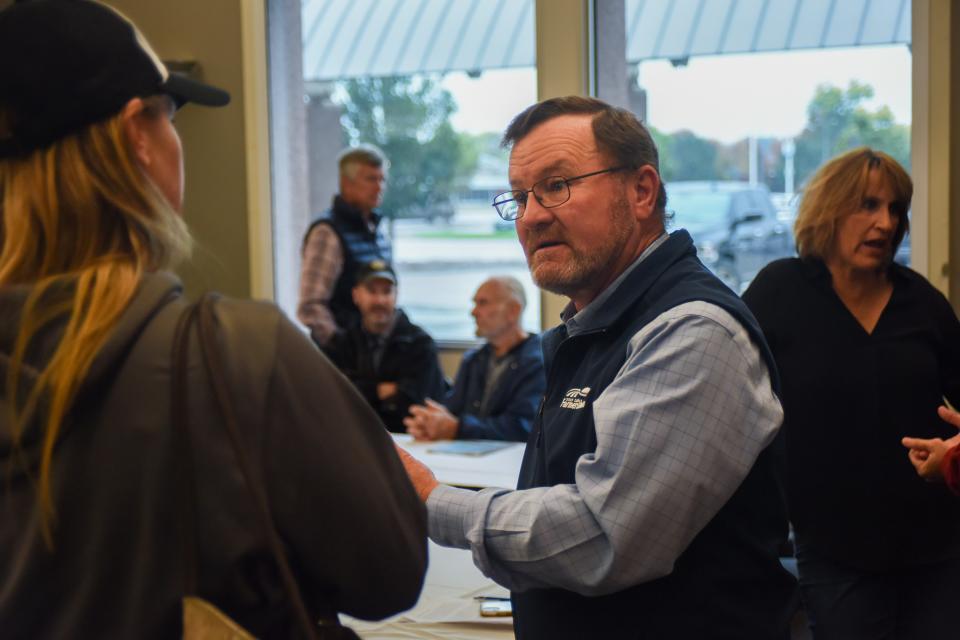
Critics like Doug Sombke, president of South Dakota Farmers Union, questioned whether employees incentivized to lobby on behalf of their employer should have registered.
“I don't see anything wrong with them bringing in members, but when you're bringing in paid staff, or you're paying their way for that, I mean, that's just borderline, right?” Sombke said. “I mean, everybody has their right to express their opinions, sit in the gallery, talk to legislators in the hall, all that. But when you're being paid to do it, you're there on the dime of your job. That's a little bit borderline, don't you think?”
Big Ethanol in Pierre
POET, headquartered in Sioux Falls, is the world’s largest biofuels producer and operates 34 ethanol facilities across eight states. The company sent about 40 people Feb. 27 to Pierre, one day before the House vote, stated Joshua Shields, POET’s senior vice president of corporate affairs, in a March 20 email.
Onida-based Ringneck Energy joined POET that same day, and Glacial Lakes Energy, an ethanol producer with multiple plants across the state, piled employees into buses the following day to advocate for SB 201.
All three companies had a vested interest seeing the bill passed and signed into law. There’s promises of tens of millions of dollars in the form of federal tax credits for each ethanol plant that can lower their product’s carbon intensity score, which Summit Carbon’s sequestration pipeline would facilitate.
Summit Carbon’s transmission line, the Midwest Carbon Express, is a multi-billion-dollar project. The proposed pipeline is slated to cross at least 496 miles of South Dakota land – since POET announced it would hook up to the Iowa company’s pipeline, the project’s footprint has grown – and is expected to become operational by 2026.
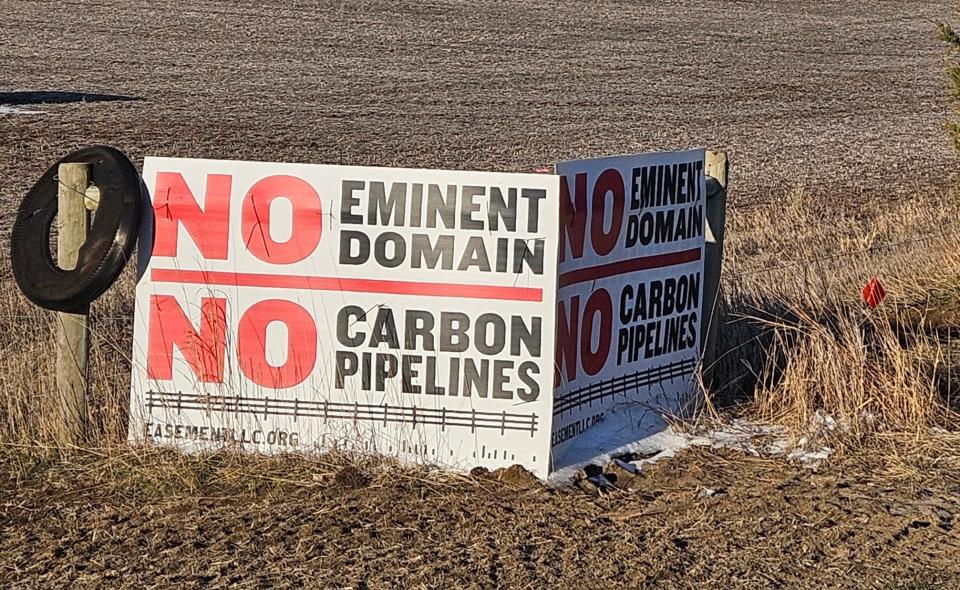
POET team members paced the halls of the Capitol the day before the SB 201 vote. Wearing teal blue hoodies with the company's logo emblazoned on the front, they caught lawmakers prior to the convention of chambers for an opportune discussion about the benefits of the economic boom expected by both.
“They were everywhere," said Rep. Fred Deutsch, R-Florence, the day after the vote.
He noticed other companies in the chamber that day, but he said it was hard to gauge exactly how many people showed up at the request of their ethanol employers.
“They filled the galleries, and they were on the floor. I mean, you couldn't — I don't know how many there were — you couldn't miss them,” he said. “There were more, way more, of them than there were legislators."
Feb. 27 was POET's designated "Day at the Capitol," a typical event in Pierre meant to offer South Dakota organizations and groups a chance to send employees, members and students to see the Capitol building, observe legislating-in-action, and talk with the state's lawmakers about any number of pending bills or general issues that could impact them. It is not uncommon for companies to provide their employees branded clothing or other attire, or to encourage attendees to wear a certain color, as a way to display one's organization.
And the First Amendment allows for the right of assembly and petition to address legislators in their personal capacity as private residents.
Jensen saw their visit differently.
“They're wearing a POET shirt, they're wearing stickers that clearly say 'Support 201' ... they're clearly lobbying for a position on a bill," Jensen said.
POET’s employees distributed brochures on the House floor, where they were conveniently met with lawmakers prior to the chamber's daily convention about what was one of the most controversial issues this session.
“Everybody that spoke to me were typical interactions that I would have with lobbyists, or concerned citizens, asking me to vote in their favor, asking me to, you know, keep an open mind, sharing their position on the benefits of what passing this bill would mean for the state of South Dakota or the ethanol industry, for the farmers," Deutsch said. "It's very typical stuff that you would hear, and what was, I think, most remarkable was that there were so many of them there and they were very well-organized."
Joining them that day was Ringneck Energy, another ethanol producer. Glacial Lakes Energy bussed employees into Pierre that same week, and the week before.
According to the South Dakota Secretary of State lobbyist database, POET, Glacial Lakes Energy and Ringneck Energy each have three registered lobbyists, Summit Carbon has 13, the anti-pipeline group Landowners for Eminent Domain has three, and Dakota Rural Action has two.
It’s unclear whether any of POET, Glacial Lakes Energy or Ringneck Energy’s registered lobbyists accompanied their respective volunteers during their visits to Pierre. None of the three companies would confirm this.
South Dakota’s lobbying laws
The underlying concern from SB 201’s critics is that corporate interests are eroding the historic hold South Dakota’s residents have on their own legislature.
This is exemplified by what critics said were the ethanol companies’ questionable lobbying efforts. These same critics also don’t believe Ringneck, POET or Glacial Lakes Energy necessarily broke any laws, partially because of some of those lacking definitions.
“Some of the people, when you talk to them and some of the employees, they don't even understand why they're there,” Fischbach said. “All they know is that they were told to be there.”
The Argus Leader reached out to Neil Fulton, Dean of University of South Dakota’s School of Law, for a neutral interpretation of the state’s lobbyist statutes. His answers did not specifically address the conduct of any specific groups or individuals, such as the ethanol companies or their volunteers.
“The threshold to register as a lobbyist is set out nicely in SDCL 2-12-1, which requires ‘any person’ who ‘employs any other person to act as a lobbyist to seek the introduction of legislation or to promote, oppose or influence in any manner the passage by the Legislature of any legislation…’ to register that person’s name with the Secretary of State,” Fulton told the Argus Leader.
South Dakota’s residents do not need to register as a lobbyist to talk to legislators, because they are protected by the First Amendment, which Joshua Shields, POET’s senior vice president of corporate affairs, argued extended to the company’s employees during their Feb. 27 visit.
“POET team members volunteered to visit their state capitol and use their First Amendment right to petition their government by talking to legislators about pipeline legislation that would impact them,” emailed Shields, who is also a registered lobbyist for POET. “The ability to have conversations with legislators about potential changes in the law that would impact our lives is a wonderful part of being a South Dakotan and an American.”
Lobbying laws are more defined in South Dakota’s neighboring states
The definition of a “lobbyist” varies from government-to-government. South Dakota is no exception, but neighboring states have more robust definitions.
In Iowa, several examples for what does and does not constitute a lobbyist are given. Generally, Iowa’s lobbyists are understood to be any individual who, “by acting directly,” receives “compensation” to “encourage the passage, defeat, approval, veto, or modification” of legislation, rules or executive orders from the state’s legislature.
Iowa also carves out a separate definition for “compensation”: “Any money, thing of value, or financial benefit conferred in return for services rendered or to be rendered.”
Similarly, Minnesota also has a definition for a “lobbyist,” which is anyone who is paid or receives compensation of more than $3,000 in a year for the purpose of influencing legislative or administrative action. Like Iowa, there are also exceptions to this definition: public officials, news media and elected local officials, for example, are not considered lobbyists.
Part of the definition of a “lobbyist” in South Dakota law hinges upon the word “employ.” A lobbyist must be specifically “employed” by someone else for the purpose of lobbying to get a bill introduced, acting for/against any bill, or otherwise trying to influence the legislative process for some group or entity other than as an individual.
The Argus Leader asked the Secretary of State’s office, which oversees lobbyists in South Dakota, for clarification on the word “employ” within the context of state law.
Deputy Secretary Tom Deadrick, who responded to the inquiry, could not provide a specific definition or example of what it means to “employ” someone to act as a lobbyist.
“If ‘employ’ is not defined either in the code or in case law, the word would have its ordinary meaning,” Deadrick stated in a March 19 email.
The laws do not state what it means to be employed as a lobbyist beyond the need to register and receive authorization from a client. This leaves the term “employ,” which typically means to make use of a person, open to interpretation.
“Expressing one’s personal opinion is NOT lobbying, you must be employed to act on behalf of others for those purposes to trigger the registration requirement,” Fulton stated. “That is express [sic] in SDCL 2-12-14 which allows individuals to speak in their own name.”
SDCL 2-12 also does not provide a direct definition of “compensation,” unlike Iowa.
“Compensation” is referenced, however. SDCL 2-12-15 includes a definition for “principals,” or groups, organizations and businesses who retain lobbyists and who are defined in South Dakota’s campaign finance requirements chapter. These principals “employ … or otherwise compensate” and “authorize” lobbyists to lobby on their behalf. “.
“Authorization,” in the context of the state’s lobbying laws, is a step in the lobbyist process that comes after registration. According to SDCL 2-12-4, a lobbyist or their client needs to provide the state secretary a written or electronic document which states that a specific lobbyist is permitted by their employer to lobby on their behalf.
Shields told the Argus Leader that POET sent volunteers to Pierre to provide lawmakers with “different perspectives from people who work in the industry, care about it, and understand why carbon capture is important.”
The visiting ethanol employees were not directly paid or authorized to act as lobbyists by POET, Shields said.
However, some forms of compensation were afforded to the ethanol employees by their employers. Shields told the Argus Leader they provided team members’ transportation to visit the Capitol on Feb. 27. Copies of emails obtained by the Argus Leader show Glacial Lakes Energy chartered a bus Feb. 28 to ask House lawmakers to support SB 201.
Ringneck went a step further. According to an internal, company-wide email from CEO Walt Wendland obtained by the Argus Leader, the head of the company offered to pay employees to lobby in Pierre. The email, dated Feb. 23, was sent to all Ringneck Energy employees and board members, both of whom showed up alongside Wendland on Feb. 27.
“We will provide transportation, a t-shirt, a button and lunch at the Capital [sic] provided by POET,” Wendland wrote. “Needless to say, your time at Ringneck is a priority but if you want to attend Ringneck will pay for your time.”
This came after Summit Carbon’s Vice President of Government Affairs Jake Ketzner emailed ethanol advocates, Wendland included, earlier that day to disseminate grassroots messaging from SB 201 proponents to lawmakers, according to an email attached to Wendland’s call for support. The email did not state which ethanol advocates Ketzner was addressing specifically.
“This is a moment for urgent action,” wrote Ketzner, who is also a registered lobbyist for Summit Carbon. “The more you are able to engage in the next week, the better.”
The Argus Leader received Ringneck Energy’s internal memo from an anonymous tip and confirmed the sending address, Wendland’s company email, by calling Ringneck Energy’s front desk.
The Argus Leader then reached out to Wendland about the memo on Feb. 28, March 8 and March 11. Four salaried Ringneck Energy employees from the company’s Onida plant, volunteered to go to Pierre to urge support for SB 201, he told the Argus Leader on March 11.
They were being paid for their time in Pierre, Wendland confirmed.
“They were not required to take time off or leave by the company,” he said.
The Argus Leader asked POET if their volunteers were salaried employees, and if they were required to take paid time off, vacation or otherwise mark their time spent in Pierre. Shields did not directly address the question.
“A small number of our POET team members volunteered their time to be there, and they worked with their managers to ensure all their duties were completed in a timely manner,” Shields stated in a March 13 email.
Glacial Lakes Energy did not answer a similar question about whether their volunteers received pay while in Pierre.
“POET, Ringneck Energy, and Glacial Lakes Energy are all members of the South Dakota Ethanol Producers Association,” Shields said. “SDEPA, as an organization and each of its individual member companies, strongly supported SB 201. POET notified SDEPA’s board which day volunteers from our team were planning to visit the Capitol, but all members’ volunteer activities were done independently.”
SB 201 opponents rankle at ethanol’s lobbying incentives
Among SB 201’s opponents, South Dakota landowners represent a portion of this group. They have formed groups, such as Landowners for Eminent Domain Reform, who have registered lobbyists.
Landowners opposed to Summit Carbon’s proposed pipeline also generally support South Dakotans First, another group focused on property rights led by Doug Sombke, president of South Dakota Farmers Union, one of two major farmer groups in the state.
Some of these landowners, in their own personal capacity, have also specifically testified to and addressed lawmakers in Pierre. Some are also farmers, whose interest in defending their property rights sometimes conflicts with their time-sensitive farming seasons — particularly during times of planting, calving and harvest.
These landowners, like the ethanol companies, also have a vested interest in SB 201. But Spink County farmer Ed Fischbach, who has personally testified in Pierre and has been involved in the state’s modern carbon discussion since its early days, told the Argus Leader the contrast between opposed landowners and the ethanol employees “couldn’t be more clear.”
“The landowners advocating on our side of the issue are all there on their own time,” Fischbach said. “There's nobody providing them transportation. They're coming on their own. Nobody's giving them a shirt or a free meal or paying them to be there. It's spontaneous.”
Brendan Johnson, a Sioux Falls lawyer who has represented POET in the past, argued it doesn’t matter whether payments for lobbying services were offered to employees.
“If you're a company and you say, ‘Hey, look, if you want to go to Pierre, you care about this issue, you want to go, we're going to pay for your transportation and you don't have to take a day off of work, we're going continue to pay you either your hourly wage or your contractual wage,’ there's no problem with that,” Johnson said. “They're still not employed as a lobbyist.”
In the case of Ringneck and Glacial Lakes Energy, though, their internal messaging appears as requests for support, with the paid wages and free travel as incentives to help push a favorable narrative on SB 201.
“The Ethanol industry is constantly being outnumber [sic] by the vocal minority trying to stop Summit from providing a future for our industry in South Dakota. Ringneck needs your help to attend the rally at the Capital to support SB 201,” Wendland wrote in his pitch to employees. “It is my belief that if the house [sic] does not pass this bill it will make the path to completion for Summit much harder.”
“WE NEED YOU IN PIERRE! THIS BILL IS CRITICAL TO THE CARBON PIPELINE AND SD ETHANOL. Show your support!” read Glacial Lakes Energy’s email.
The Argus Leader asked Wendland about how long his employees had been involved in the legislative process and whether they understood the contents of SB 201.
“We've been trying to share some information about it prior to them coming, so they had, they knew what the talking points were,” Wendland said. “We've definitely been keeping them abreast of kind of what's going on in the legislature, but, up until this point, we haven't really asked them to get involved in the capitol until we really saw the need to get the word out.”
Ethanol companies didn’t break South Dakota’s lobbying laws, critics say, but their actions are ‘borderline’
Jensen, who represents Dakota Rural Action, a group generally opposed to SB 201 and similar legislation proposed by the state’s legislative leadership, takes issue with these incentives. It’s all “manufactured grassroots support,” he told the Argus Leader, “to counteract the fact that the only people who are grassroots showing up are opposed” to SB 201.
It’s not anything Jensen would call illegal. But, in the scope of South Dakota’s relatively brief lobbyist definition and the ethanol company’s organized forces, he questioned where the line is drawn between organizations who drum up incentivized support and the trigger for needing to register as a lobbyist.
"I'm paid to be here, but I register as a lobbyist. I get cleared. I have a badge. It tells people I'm being paid to represent this group,” Jensen said. “Are you allowed to be here and lobby someone to vote on a certain bill, if you're being paid to lobby them that directly, without registering? Like, is that different than what I'm doing?”
In Johnson’s opinion, there is still a “major distinction” in the act of volunteering to address lawmakers — encouraged or not, and regardless of potential compensation.
The lobbying law, Johnson said, was designed to allow people to testify before a legislative committee in their personal capacity without having to register as lobbyists and without having to pay the state’s $40 registration fee.
“Well, are they talking on behalf of the company or are they talking, you know, because they care about the issue and they're volunteering to go out to Pierre?” Johnson said.
Where “volunteer lobbyists” are concerned, USD’s dean of law said the key term to the state’s lobbying law, “employ,” is not necessarily dependent upon financial or other reimbursements.
“‘Employment’ does not require compensation,” Fulton said. “Several charitable, philanthropic, and religious entities and organizations utilize volunteer lobbyists on a regular basis. They all register. ‘Employment’ as a lobbyist is defined in the registration statute based on the purpose of their activity, not compensation.”
Legislators react
POET, Ringneck and Glacial Lakes Energy are not the first companies to funnel employees to the Capitol. It happens each year, with bookings spread across the state’s Legislative Social Calendar.
The South Dakota Education Association sent members Feb. 26 to Pierre, for instance, to meet lawmakers on the topic of public education. Their lobby day website depicts the event as a networking opportunity with the dual purpose of advocating for public schools — hotel stays were covered by the association.
The Argus Leader reached out to more than a dozen lawmakers after the House vote on Feb. 27 to gather reactions to the lobbying efforts of the ethanol companies.
The Argus Leader described to lawmakers the paid-for travel arranged by POET, Ringneck and Glacial Lakes Energy, as well as Wendland’s offer of payment to employees.
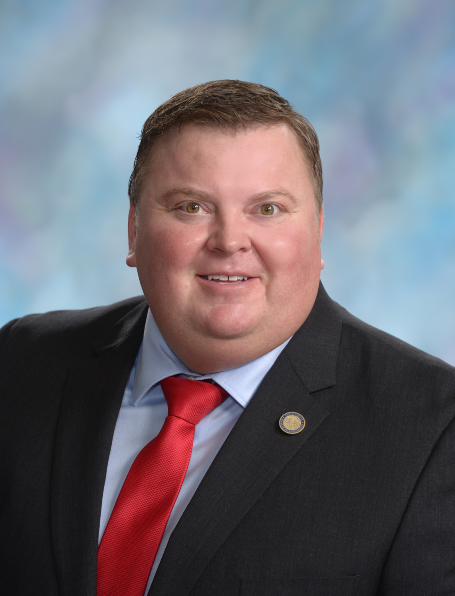
Rep. Chris Karr, R-Sioux Falls, who voted “no” on SB 201, shared the opinion of the bill’s opponents that it’s standard fare for organizations to send people to Pierre to meet with lawmakers.
But Karr said he hadn’t heard of a similar instance akin to Ringneck Energy’s offer to pay for their employee’s time.
“I have never heard of somebody paying people like that to go and lobby … that aren't registered lobbyists,” Karr said. “I think there's some shades of gray with that, because there's definitely organizations that come all the time that probably have their employees that are there to talk about their businesses and things like that.”
Rep. Marty Overweg, another “no” vote, did not interact with the employees much. He said “very few talked” to him because of his opposing stance on SB 201, but he still believed they handled themselves with decorum.
“I don't know the lobbyist laws, but I think it's always great when citizens of South Dakota come to Pierre and talk to their lawmakers when it's important to them,” Overweg said.
Rep. Eric Emery, D-Rosebud, did, however, talk to the ethanol visitors. He said his personal conversations with them were centered on the benefits of the Summit Carbon pipeline and the “economic boom” that could come with it, though he still voted against the measure.
“If [Ringneck Energy’s] CEO is allowing their employees to come lobby on their behalf and providing them transportation, I can see that that's, you know, there could be some ethical implications with that,” Emery said. “But you know, did I know that that day? No, I had no clue that that was even going on.”
The Argus Leader reached out to more than half a dozen lawmakers who voted “yes” on SB 201 to gauge their reaction to the ethanol companies’ presence. Multiple “yes” voters did not return calls or voicemails asking for their input.
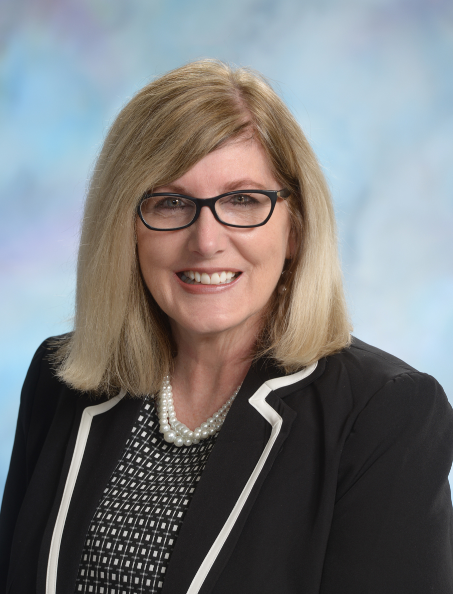
Rep. Mary Fitzgerald, R-Spearfish, did respond. She did not describe the ethanol employees’ influence — or the wider influence of lobbyists in Pierre — as something effective on the state’s legislative bodies.
Fitzgerald also said lobbying could be “good or bad” for one’s cause.
“You can highly pressure legislators so much that it turns them off, too,” Fitzgerald said. “They'll basically stop listening to you. So, I think you kind of get used to being in contact with those lobbyists, and you just kind of learn to make your own decisions.”
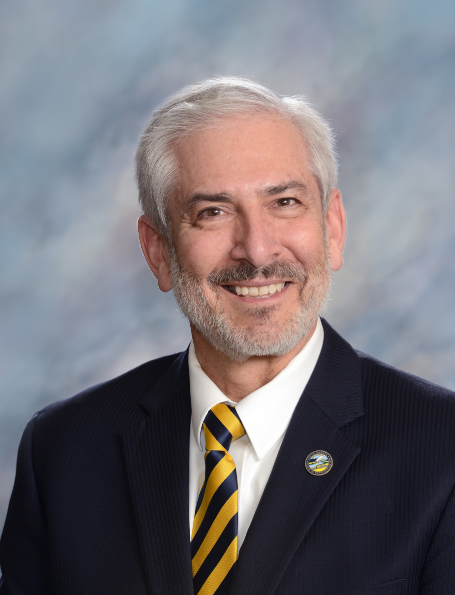
Deutsch is one such legislator. He told the Argus Leader he received an email from Jim Seurer, Glacial Lakes Energy CEO, who threatened to somehow get involved in Deutsch’s upcoming primary race in June.
“While it’s our policy to typically remain neutral and stay out of political races, I can assure you this could change if we feel elected incumbents or other candidates are acting outside of our company or shareholders’ best interests,” Seurer wrote Deutsch in a Feb. 14 email.
The email, though it came from Seurer, was explicitly written in a way that Glacial Lakes Energy, the company, “can and will become in involved” in Deutsch’s upcoming primary election.
Seurer also wrote the company would be “monitoring” Deutsch’s vote to make sure he would be “acting in [their] best interest.”
“Going forward, we expect your support of those Bills (House or Senate) which would allow this project to move forward and your opposition to those Bills which would restrict or kill this project,” Seurer wrote.
The ethanol CEO underlined this section, along with the “monitoring” statement, in the original email.
This was something Deutsch said he did not appreciate. He said he took it as a “threat.”
“As a legislator, I'm going to listen to both sides and I'm going to make an assessment and vote how I believe is best," Deutsch said. “But this goes beyond the pale, where, you know, either get in line or we're going to get somebody else take your place.”
The Argus Leader reached out to Seurer for clarification on the contents of the email he sent Deutsch.
“Like many businesses, Glacial Lakes Energy consistently monitors regulatory and political issues that affect our industry and our stakeholders,” Seurer stated in a March 5 email response to the Argus Leader. “Marketplace trends and consumer preferences around the globe and in markets we serve are rapidly evolving. We strongly believe the CO2 pipeline project helps us remain competitive and preserves the viability of the ethanol industry for South Dakota’s #1 industry, agriculture.”
Then, in a March 14 voicemail, Seurer clarified the email he sent to Deutsch “was simply … reminding him that he is accountable to his constituents in his district.”
None of Glacial Lakes Energy’s four ethanol plants are located within Deutsch’s District 4. The company’s Watertown plant is the closest facility to Deutsch’s district and resides within District 5, which covers the city’s urban limits and its surroundings, as well as nearby water bodies. District 5 is entirely surrounded by District 4.
The letter sent to Deutsch is symptomatic of a larger issue, Jensen expressed. He said the open threat to Deutsch, and the lobbying done by the ethanol companies, are emblematic of the growing corporate hold on South Dakota’s legislature.
“It is out-of-state billionaires who are now going to be taking over the South Dakota legislature to to further their corporate interests,” Jensen said. “I mean, it's the worst case scenario for a free market democracy, that they would explicitly threaten to get involved and restack who's in power in the state. And it's not like if they are successful in doing this, they're going to stop with Senate Bill 201. They're not going to just give up political control.”
Sombke, who is opposed to SB 201, is skeptical about Fitzgerald’s view on the effectiveness of lobbying in South Dakota. They have a foothold in the lawmaking process, Sombke argued.
“Let’s put the shoe on the other foot: If lobbying doesn't work, then how come the likes of, you know, POET and Summit and all these ethanol [companies], why are they doing it then?” Sombke questioned. “It works. Don't kid yourself.”
Fulton said lobbyists and outside pressure from interested parties can coerce lawmakers to vote in a particular way.
However, Fulton added their effectiveness can vary.
“Do those events have influence on the Legislature?” Fulton emailed. “That answer probably varies significantly based on the individual legislator, group, and issue.”
According to a 2015 assessment of government transparency and accountability from The Center for Public Integrity, the latest report of its kind, South Dakota ranked 47th and received an overall “F” grade for its “weak” lobbying disclosure laws
South Dakota ranked 42nd in the report’s “ethics enforcement agencies” category and 49th in the “lobbying disclosure” category.
This article originally appeared on Sioux Falls Argus Leader: Critics say SD ethanol lobbying on pipeline bill entered a ‘gray’ area

